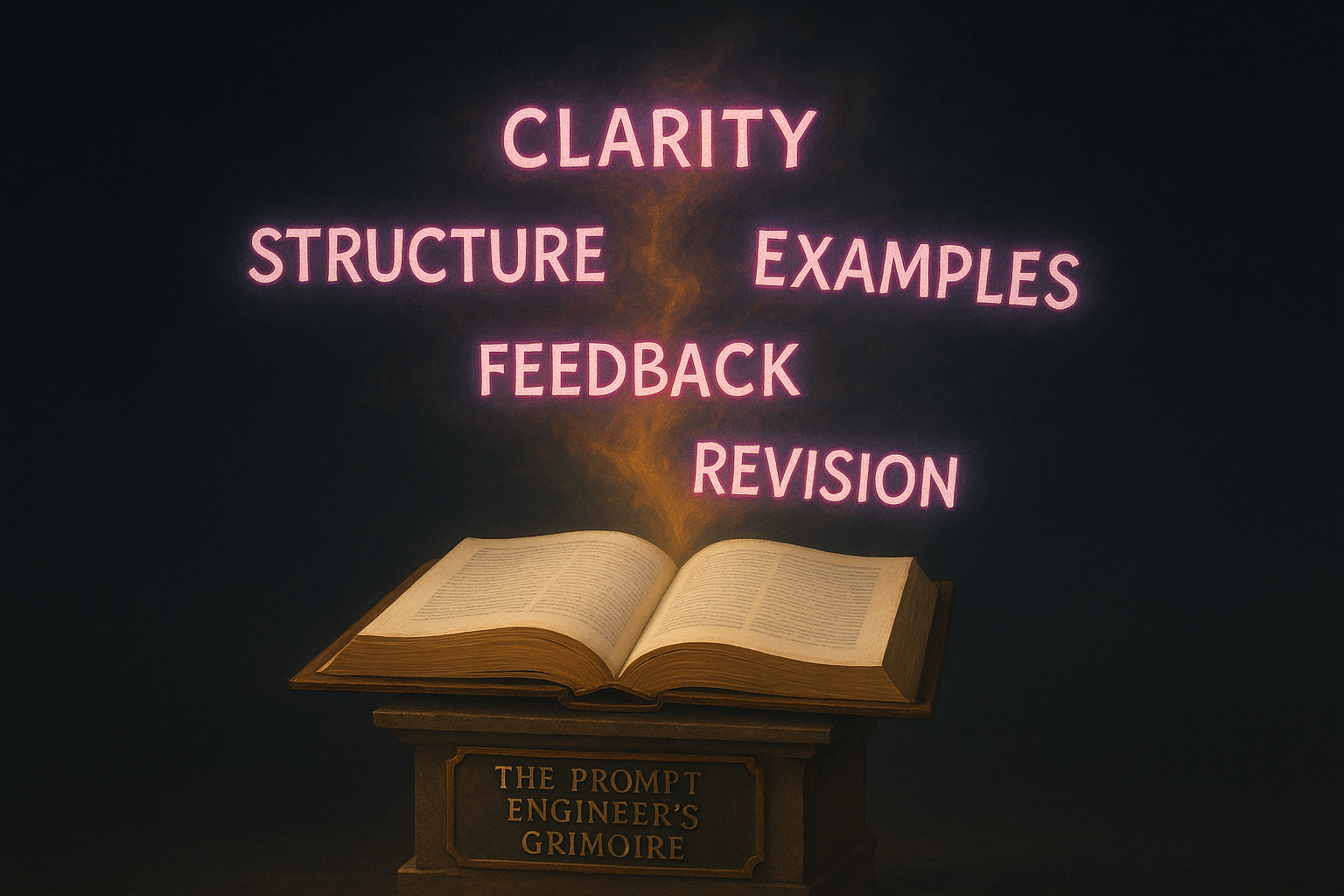The Prompt Engineer's Grimoire
You don’t need a spellbook — you need clear words, well chosen and deliberately used.

You’ve seen the headlines.
“Unlock the power of AI with this one weird prompt.”
“Prepare to be Shocked: The Top 10 Prompts to Automate Your Job!”
“The ULTIMATE ChatGPT Prompt Stack — Steal These Now!”
“The Secret HACKS They Don’t Want You to Know!!!”
I know, I’m being unfair. Those aren’t actual headlines — although I wouldn't be surprised if they’re being workshopped by at least one publication right now.
But I am being purposefully sensationalist for a reason: because there are dozens of real articles out there pushing the same tired idea:
Here’s a magic trick that will make AI better for you.
Claptrap.
These are bargain-bin paperback spellbooks dressed up as productivity hacks. A shiny cover, scribbled pages, and no substance — just copy-paste incantations that will allegedy turn lead into gold.
This isn’t a new problem. In In the Beginning Was the Command Line, Neal Stephenson compares early operating systems to arcane rituals — systems only the initiated could use, full of invisible rules and sacred syntax. The command line wasn’t a user interface. It was a spellcasting interface.
What’s wild is that we’ve come full circle. We finally have tools that understand natural language — and people are still trying to turn them back into command lines. The AI systems people interact with most today – LLMs, or Large Language Models – speak to you in plain English. So it shouldn’t be a surprise that what you need isn’t spells or syntax.
You need to develop a command and mastery of the most essential building block of collaboration and creativity.
You need to sharpen your words.
AIs Aren’t People — But They Can Talk Like One
This isn’t the command line.
This isn’t a search engine.
This isn’t coding a Python script.
LLMs operate using natural language — the same language you’d use with a colleague, a friend, or anyone else you’re trying to work something out with.
They don’t require precise syntax.
They aren’t waiting for special punctuation or magic keywords.
You don’t need to "speak the cant" or invoke obscure terms to get what you want.
You need to do what you already do with people:
Use language clearly and deliberately.
Getting a good answer from an AI is fundamentally the same as getting a good answer from a human. If your request would be confusing to a person, it’s probably confusing to the model too.
The good news? You probably already know how to talk to an AI — you just need to do it with intention.
Prompt Libraries Are a Crutch
You can get value from a saved prompt. Sometimes they save time. Other times, they provide a helpful template.
But here’s the thing about crutches:
They’re for people who can’t walk on their own.
You wouldn’t use them to run a marathon.
Prompt libraries are a shortcut, not a substitute.
They don’t teach you how to think.
They don’t teach you how to communicate with purpose.
And they definitely don’t help when you don’t yet know what you want — which, let’s be honest, is how most of my best, most creative work actually begins.
“Hey, I’m chasing a half-formed idea. Can we talk it through?”
You can’t paste a library prompt into that.
You have to discover the shape of the idea as you go.
The act of writing it – structuring your words – is part of the act of figuring it out.
And every time you offload that to a prefab prompt, you atrophy your ability to discover.
The Skill Isn’t Prompting — It’s Language Mastery
Here’s the “one weird trick” truth nobody seems to be willing to just come out and say:
Prompt engineering is just language mastery with a marketable new name.
It’s the same skill you use to:
- Write good instructions
- Draft a clear, concise email
- Explain a complex idea to someone new
You don’t need to learn a new system.
You just need to sharpen the tools you already use:
- Clarity
- Structure
- Brevity
- Examples
- Feedback
- Revision
Once you have those?
You’re already better than 95% of the “prompt engineers” on the market.
Why Precision Matters
A friend of mine generates AI art. She’s incredibly creative — she can see what she wants in her mind — but often struggles to get the output she’s picturing. Not because the AI isn’t capable, but because she doesn’t yet have the words to describe what she wants.
She’s not alone. This is common.
The barrier isn’t imagination.
It’s articulation. It's expression. It's converting your thought into words.
LLMs and image generators don’t read your mind. (Thank the Maker!)
They read your language.
If you don’t have the right words — or structure — your intent gets lost in the noise.
You end up iterating anyway, just more painfully.
The bonus? Learning to describe what you want doesn’t just make you better at talking to machines — It makes you better at working with humans too.
There is no human prompt engineering library.
We just call that being a good communicator.
The Myth of the One-and-Done Prompt
Let’s kill this myth once and for all:
“If you just use this one prompt, you’ll get the perfect output.”
No. Full stop.
The best results — just like with real collaborators — come from iteration.
The parallel here is with writing. Your first draft is rarely your best – mine certainly aren't! It's a scaffolding, a thing you construct to provide structure to what you're really building. They aren't pretty, and they aren't intended to be.
Prompting is the same way. Start rough, plan to revise. Discover what works and what doesn't as you go along.
Clarification.
Dialogue.
Refinement.
Continuous improvement, bit by bit.
And that’s the part prompt libraries can’t capture: The act of shaping an idea over time.
In fact, prompt libraries discourage that process. They give the illusion that the answer is out there, fully formed. That if you can just find the right spell, the right incantation, you'll get what you want, every time.
But real work isn’t magic.
It’s craft.
The New Spellbook
I’ve read dozens of these prompt-engineering “thought pieces,” mostly out of morbid curiosity. Nearly all of them could be replaced with a checklist:
- Be clear about your intent
- Break it into logical pieces
- Define your terms
- Give examples and fill in context
- Be explicit about expected output
- Plan to iterate and revise
- Treat AI like a collaboration partner — not a magic box
That’s it.
That’s the whole grimoire.
